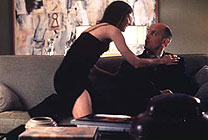|
|
|
|
Being
John Malkovich
|
 |
|
What would it be like to enter the mind and body of a fabulously successful media celebrity? The initial answer given in Being John Malkovich seems to be: not much. The life of Malkovich – cleaning his teeth, reading the newspaper, going for a stroll – appears to be as banal and routine as anybody else's. But the very moment that those who have been given the magic privilege of being inside Malkovich find themselves spat out on the side of a busy highway, they are ecstatic: their dreary, monotonous lives are suddenly, for the first time, exciting and meaningful. This is only the first of many dark paradoxes at the centre of Spike Jonze's mind-boggling fantasy. It is hard not to think of this movie as a riotous fantasia on the faddish obsession with virtual realities and cyber-identities. Craig (John Cusack), the lucky guy who chances upon the secret portal allowing access into Malkovich's brain, is a fairly pathetic puppeteer in his spare time: his ignoble dream, ultimately, is to control this host body as expertly as he pulls the strings of his wooden creations. The Malkovich-experience, however, is rendered by the film as a very primitive VR ride: wonky vision, tinny sound. The real drama here becomes Malkovich's own resistance to the increasing invasion of his personal space. He finds himself factored out even from sex scenes where he is nominally present: the inner Craig moves Malkovich's hands, while Maxine (Catherine Keener) stares into his eyes, searching for signs of the consciousness of her lover Lotte (Cameron Diaz), previously Craig's mousey, homely wife. Being John Malkovich strikes me as a '90s take on Scorsese's masterpiece The King of Comedy (1982). Both films begin with a lonely dreamer being yelled down at home. Both trace the mad dream of wanting to emulate – and finally supersede – a media celebrity. Both are finely tuned into the thousand, tiny humiliations and frustrations that comprise a state of contemporary alienation. Both revel in a condition of modern kinkiness or perversity, but also inspect the fundamental joylessness of such postures. Jonze, making his feature debut after a career in commercials and music videos, wisely treats this material in as straight-faced a way as he can. There is no need for crazy camera angles when the cast is already stooped over inside a set that depicts the seventh-and-a-half-floor of a dour workplace. If there is a genius behind Being John Malkovich, it is the scriptwriter, Charlie Kaufman. I would not be surprised to learn that he is a keen student of those arch surrealists Luis Buñuel or Raśl Ruiz, since his story calmly and logically goes to the bitter end of every outrageous possibility opened up by the host-identity premise. Perhaps the very best thing about the film is that, like Cronenberg's eXistenZ (1999), it relishes the making of large-scale plot moves. At half hour intervals, having seemingly exhausted the possibilities of its situation, it launches onto a new and more surprising plateau. With each twist, the characters are transformed into different, more dangerous creatures with which to be reckoned. Among the plot's wilder excursions are a sequence where Malkovich enters his own head; a chase through the chambers of the star's subconscious (complete with little Johnny watching his parents have sex); and a flashback located within the traumatised mind of a caged chimp. The film occasionally lapses into undergraduate silliness – although even the celebrity cameos (Brad Pitt, Sean Penn) and showbiz in-jokes are pretty endearing. Jonze's talent for pastiche – as in the hilarious "American Arts and Culture Biography" of Malkovich the puppeteer glimpsed on a TV set (also presented as a self-contained extra on the DVD release) – is flawless. The film is at its best, blackest and most disquieting, however, when it slyly repeats particular actions, lines or situations – such as the opening puppet dance that is later enacted in the flesh by Malkovich. This device creates an odd, indecidable tone somewhere between irony and pathos that keeps us guessing and wondering well after the story has run its course. All of the cast are terrific, since they are given such great material to embellish. One can only admire Malkovich for agreeing to play such an unlovely parody of himself. Keener (Living in Oblivion, 1995) almost steals the show as a heartless vamp who deflates male fantasies at every turn – but who, in turn, also falls prey to the treacherous seductions of the Malkovich portal. Who, these days, wouldn't? MORE Kaufman: Eternal Sunshine of the Spotless MInd, Human Nature, Confessions of a Dangerous Mind © Adrian Martin December 1999 |
![]()